NEWS FROM THE DEPARTMENT OF INDUSTRIAL & SYSTEMS ENGINEERING

FEATURED IN THIS ISSUE: THE BATTLE AGAINST TIME
Read how Mostafa Reisi Gahrooei, Ph.D., is helping first responders make time-sensitive decisions after disasters occur.


Read how Mostafa Reisi Gahrooei, Ph.D., is helping first responders make time-sensitive decisions after disasters occur.
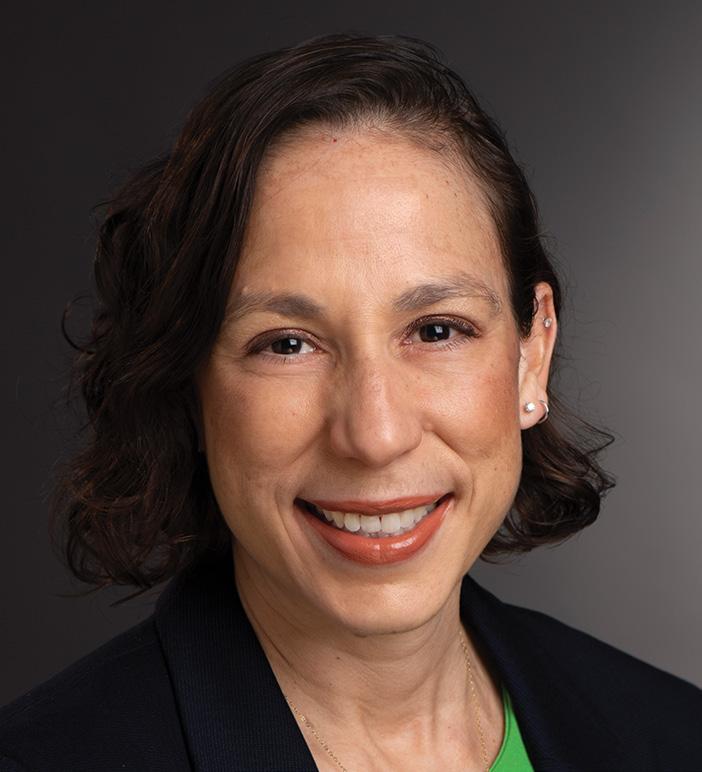
I am thrilled and excited to have become a part of Gator Engineering and the Department of Industrial & Systems Engineering (ISE) this past January 2024. Stay tuned as new initiatives ramp up and our facilities get expanded. Also, a big thank you to David Kaber, Ph.D., who served as department chair for five years and has been instrumental in a smooth leadership transition in the middle of a busy academic year—a year in which our department continued to be as dynamic as ever, with significant accomplishments by our students, faculty and alumni. I am extremely proud of them all, and these accomplishments ensure that our department continues to thrive while we uphold our values of providing experiential learning opportunities to our students while conducting world-class research here at the University of Florida (UF).
As you read through this year’s edition of ISE Insider, you will first have a chance to learn about the research efforts our faculty are doing and how they continue to positively impact our society both in the real world and in the classroom. We are proud to display the work Mostafa Reisi Gahrooei, Ph.D., is doing to preserve the privacy of farmers (Page 4) and assist first responders with adequate responses after disasters (Page 10-11), the process by which Jorge A. Sefair, Ph.D., is helping the Transportation Security Administration (TSA) enhance its decision-making at airports (Page 5), and how Yu Yang, Ph.D., is creating novel framework to help policymakers regulate new infrastructures (Page 6). We also shine a light on Kaber and the impacts he had during his Erskine Visiting Fellowship in Christchurch, New Zealand following his time with our department (Page 7) and the arrival of one of the country’s largest and most advanced 3D construction printers to campus (Page 12).
Along with my introduction to the department (Page 8), we also highlight the new faculty hires we welcomed during the Fall semester (Page 9). Suman Chowdhury, Ph.D., and Murwan Siddig, Ph.D., bring years of experience to Gainesville and we are thrilled to see them join our team.
Following the articles about our faculty, we display how our department is continuing to thrive at the undergraduate and graduate levels. You will read how our department experienced significant growth during the Fall 2023 semester (Page 13) while also gaining updates on our Outreach Engineering Management program and how that program continues to draw strong demand from industry partners and students throughout the state of Florida and beyond (Page 16-17).
To pay tribute to the life and legacy of Robert Braswell, Ph.D., we highlight a story that shows his role as a major figure in the development of our department (Page 14-15). Finally, you will read about a pair of our alumni, Franco Nazarian (UF Division of Student Life Hall of Fame Recipient) and Scott Bartnick (Gator100 honoree), who both earned impressive honors in 2024 (Page 18-19).
Fantastic things are on the horizon here at UF ISE, and I cannot wait to share more with you in future versions of ISE Insider. Thank you for your continued support of our department.

Iris V. Rivero,
Ph.D.
Department
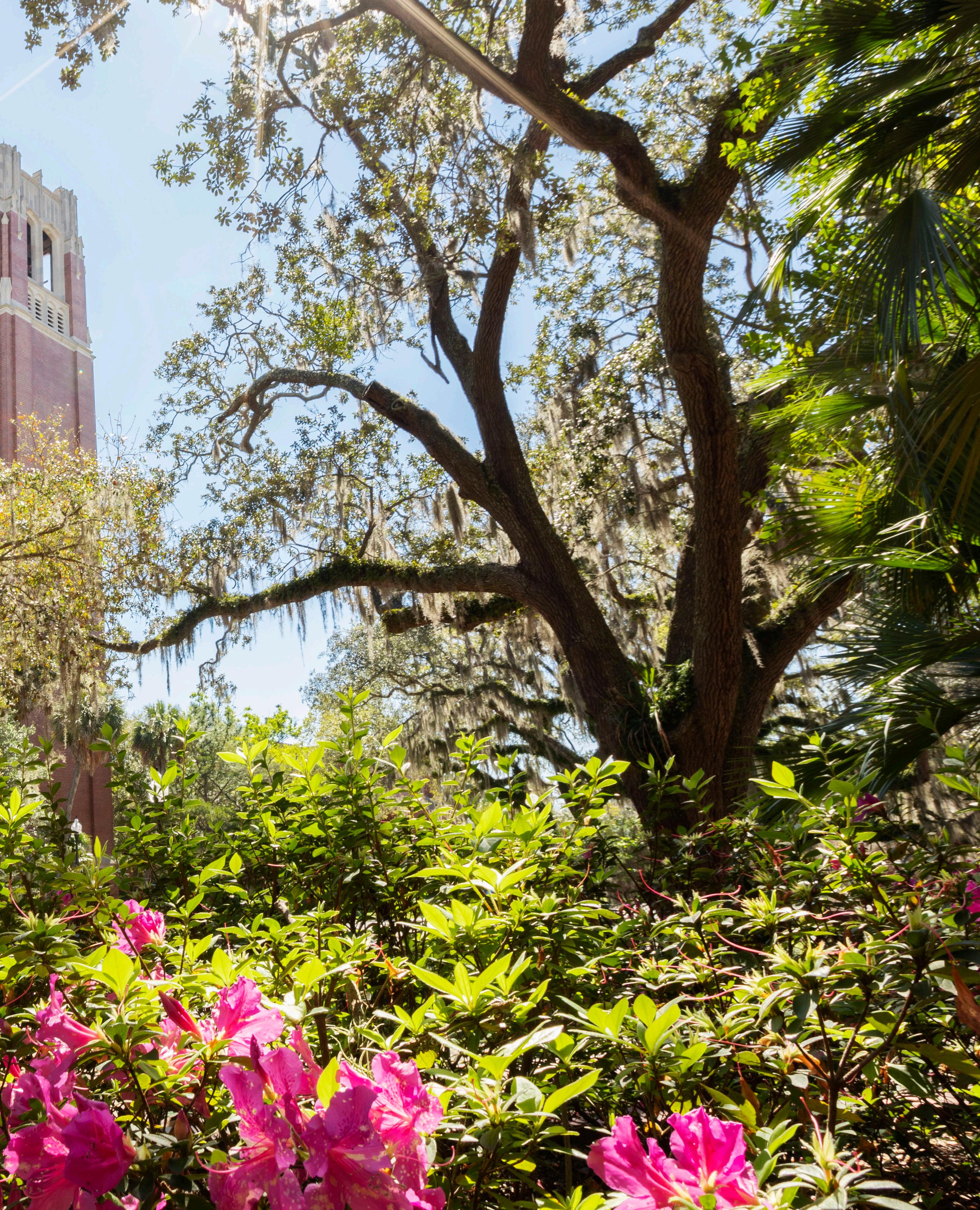
OEM
Associate
Mostafa Reisi Gahrooei, Ph.D., is helping protect the privacy of farmers through novel framework.
By Brady Budke
The National Science Foundation has awarded a $1.18 million grant to a team of researchers at the University of Florida. Led by Mostafa Reisi Gahrooei, Ph.D., an assistant professor, the team will develop a new framework that encourages collaboration and personalization in the data-driven modeling of agricultural farms while protecting data privacy.

Reisi Gahrooei will work with coprincipal investigators Yiannis Ampatzidis, Ph.D., and Ute Albrecht, Ph.D., both associate professors with the UF Institute of Food and Agricultural Sciences, Southwest Florida Research and Education.
“In a centralized approach, farms share their data with a central server to develop analytical models to support farm decisionmaking,” Reisi Gahrooei said. “Under this scenario, farmers may be hesitant about how their data is being used and whether it is shared with other third parties and growers.”
The researchers proposed a new approach to design algorithmic solutions that allow farms to keep their data locally instead of sharing it with a central server. Each farm creates a local model that is transmitted to an aggregator. Once an aggregated model is created, it is then broadcast to each farm to create a personalized model that supports local decision-making. The approach eliminates data-sharing requirements while still allowing for benefit to be gained from knowledge that exists in other farms.
“The fundamental methodologies developed in this project should
be applied to real datasets collected at multiple agricultural farms, with potentially different data collection protocols and standards,” Reisi Gahrooei said. “In addition, data collected at various farms often differ in size and distribution due to economic and geographic differences. Addressing these differences to develop generalizable models useful to all participating farms is very challenging.”
The group plans to evaluate the proposed “federated farming analytics” in modeling a collection of citrus farms as a case study. Along with this, the proposed cyberinfrastructure can easily be adapted to other specialty crops, especially other tree crops, and production systems. The group looks to focus on perennial crops, such as fruit trees, nut trees, and key vegetable crops.




By Brady Budke
Jorge A. Sefair, Ph.D., an associate professor, is currently the principal investigator on a project that works closely with the TSA to improve its decisionmaking processes in many aspects, such as passenger volume prediction, staffing and capacity planning. The project is funded through the Center for Accelerating Operational Efficiency, a Department of Homeland Security (DHS) center of excellence.
“Our models are expected to facilitate the decision-making process for TSA, ensuring the efficient use of the resources without compromising the security level of the screening operation,” Sefair said. “The goal of TSA is to maintain (and increase) the standard of security in all travel operations while at the same time offering a positive experience to passengers reflected in short wait times. Our tools are intended to facilitate this mission.”
Sefair said working closely with TSA decision-makers to develop models that fit their needs requires the group of researchers to understand the complex operations of security checkpoints and baggage screening. This is an essential element since the models need to reflect their operation to be adopted.
Jorge A. Sefair, Ph.D., is working to improve decision-making for the Transportation Security Administration (TSA) at airports.
“Some of the model features include movement of officers across checkpoints, design of work breaks and overtime schedules, ramp-up and ramp-down rules when opening or closing screening lanes, estimation of queue lengths at every 15-minute interval of the day, among others,” Sefair said. “The resulting challenge is the computational time required to solve some of our models. To overcome this challenge, we implemented various techniques to reduce the complexity of the mathematical model, decompose the problem into a series of subproblems that are easier to solve, and exploit the properties of an optimal operational plan.”
Sefair said an example of the research group’s work was seen at Phoenix Sky Harbor International Airport, where they developed a model for TSA to estimate the passenger arrival preferences during the COVID-19 pandemic. Since it was not possible to collect field data in person at the time, the group relied on CCTV footage and computer vision algorithms to count the number of passengers arriving at the checkpoint. The group then used those numbers to feed a statistical learning model to determine the updated arrival curve, which found that passengers preferred to arrive closer to their departure time in comparison to travel prior to the COVID-19 pandemic. Sefair said this was helpful for the TSA to adjust the passenger arrival
predictions and their corresponding operational decisions (e.g., checkpoint staffing).
“Given the requirements expressed by our partners at TSA’s ITF [Innovation Task Force], we recently extended our models to capture the baggage screening operations, and we are hoping to see our tools being used nationwide” Sefair said. “There are opportunities to extend our work to other components of DHS such as the Customs and Border Protection agency, as they face similar challenging problems at the US borders and ports of entry.”

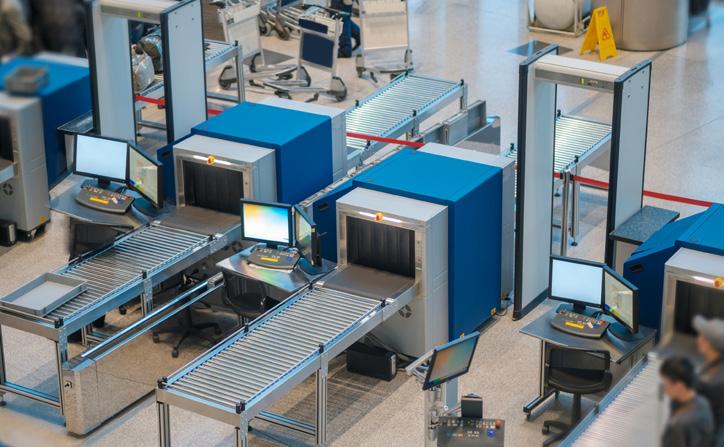
By Brady Budke
The emergences of new infrastructure systems continues to impact existing civil infrastructure, especially when it comes to individual transportation systems and access for disadvantaged populations. Related to this situation, it remains unclear how to properly measure equity in delivery of these new systems due to their high operational dynamics and overall uncertainty.
Using a newly awarded grant from the National Science Foundation, Yu Yang, Ph.D., an assistant professor, will develop measures and create a novel framework of analysis that can support policymaking for these new infrastructure systems. The project will provide a deeper understanding of the role that fairness and associated tradeoffs play in the design and operation of these emerging infrastructures.
“This project was motivated by the fact that the adoption of emerging technologies in infrastructure systems significantly impacts equity,” Yang said. “There is a lack of systematic ways to define fairness for systems with high dynamics, and little is known about the fairness tradeoffs.”
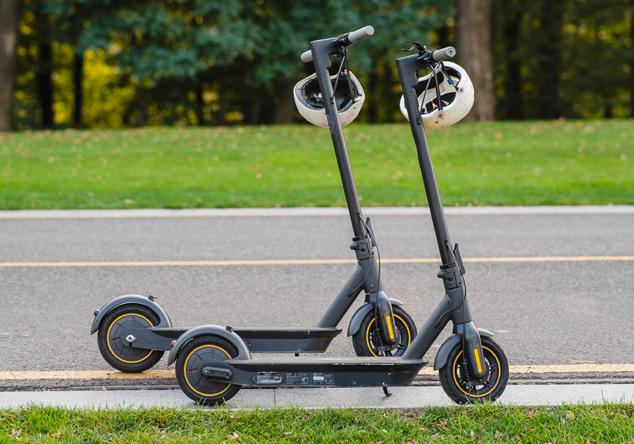
As an example, Yang cites how newly emerging electric scooter systems are going against the overall equity model that is present in existing infrastructures, like public transit. Because of the unique challenges that come with measuring fairness in electric scooter
access and use, the research by Yang is set to provide policymakers with a more holistic picture to guide decision-making on various regulations that can uphold equity principles to access transportation.

“We will build a new optimization model to effectively compute the price of fairness at various levels of fairness in system access using a diverse set of fairness measures. We will also perform extensive tradeoff analyses to assist in policymaking on fairness in system use,” Yang said. “We hope to verify that these measures can precisely evaluate system fairness and that our optimization models can effectively compute the efficiency loss due to newly enforced fairness requirements. These developments are expected to support comprehensive analysis of fairness and the efficiency of tradeoffs.”
A case study that involves shared micro-mobility systems and various experiments using real-world data will be used to help conduct and analyze tradeoffs and provide insights for fairness policymaking. The research findings will be implemented into undergraduate and graduate courses to help show the challenges of measuring and promoting fairness in civil infrastructure system access through new emerging technologies.
Following his time as the UF ISE department chair, David Kaber, Ph.D., traveled overseas to continue his research at the University of Canterbury in Christchurch, New Zealand.
By Brady Budke
At the end of 2023, David Kaber, Ph.D., completed his service as the chair of the Department of Industrial & Systems Engineering. With his departure, Kaber elected to take research leave for the spring and summer terms. He applied for and received a Erskine Visiting Fellowship from the University of Canterbury (UC) in Christchurch, New Zealand. This program provides support for senior international academics to teach at UC each year.

Kaber proposed a course on Advanced Human-Computer Interaction (HCI) Modelling to the UC Computer Science & Software Engineering (CSSE) Department. The Department and Erskine Program accepted Kaber’s proposal and requested he work with UC CSSE Ph.D. students during a four-month visit to the South Island of New Zealand.
Kaber and his family (partner Soyun and 5-year-old daughter, Claire) traveled to New Zealand in early March. Kaber prepared lectures on human information processing, constructs of human cognition, measures of mental workload, cognitive task analysis methods, cognitive performance modeling tools, physiological correlates of cognitive workload, and systems design for cognitive demands. The lecture content will be made available for fourth year (senior) UC students through online resources. It will also provide a basis for a similar future course at UF.
In addition to new course development, Kaber collaborated with Christoph Bartneck, Ph.D., associate professor, in supervising CSSE Ph.D. students in human-robot interaction (HRI) research along with UC faculty from CSSE, the Psychology Programme and the Philosophy Department.
“The research the UC students are conducting is at the cutting edges of the HRI discipline and is definitely pushing me to go beyond my comfort zone from workload and situation awareness analysis,” Kaber said.
Kaber said the HRI research projects being conducted at the UC CSSE Department are highly intriguing and truly require an interdisciplinary approach where one
needs to learn the technical language and theoretical foundations of other disciplines. Although this can be very challenging and occasionally time consuming, Kaber said learning about other areas of science and the methods that are applied can help engineers be more comprehensive in analysis and at developing bases for effective human-system designs.
“Sometimes you have to go out of your comfort zone and even wonder whether you are making effective use of your time in order to gain new knowledge that might ultimately have relevance/importance to what you do, although you might not see it right away,” Kaber said.
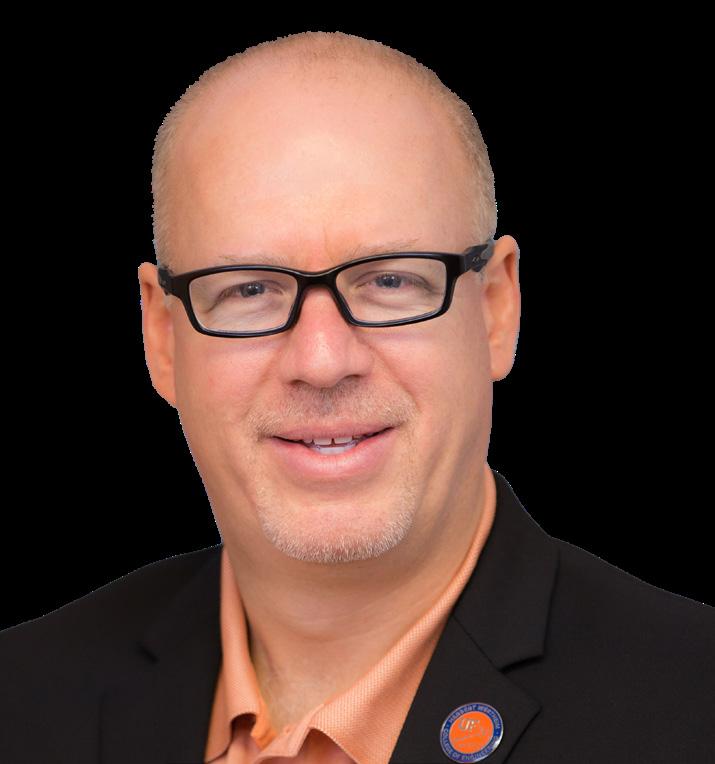

Iris
is the first Hispanic woman to take the helm of the department�
By Brady Budke
In January, the Department of Industrial & Systems Engineering (ISE) welcomed Iris V. Rivero, Ph.D., the Paul and Heidi Brown Preeminent Chair in Industrial and Systems Engineering.
Rivero comes to UF after serving five years as the Kate Gleason Professor and Department Head of Industrial and Systems Engineering at the Rochester Institute of Technology. Her experience in higher education also includes her faculty positions at Iowa State University and Texas Tech University. Rivero earned her bachelor’s,
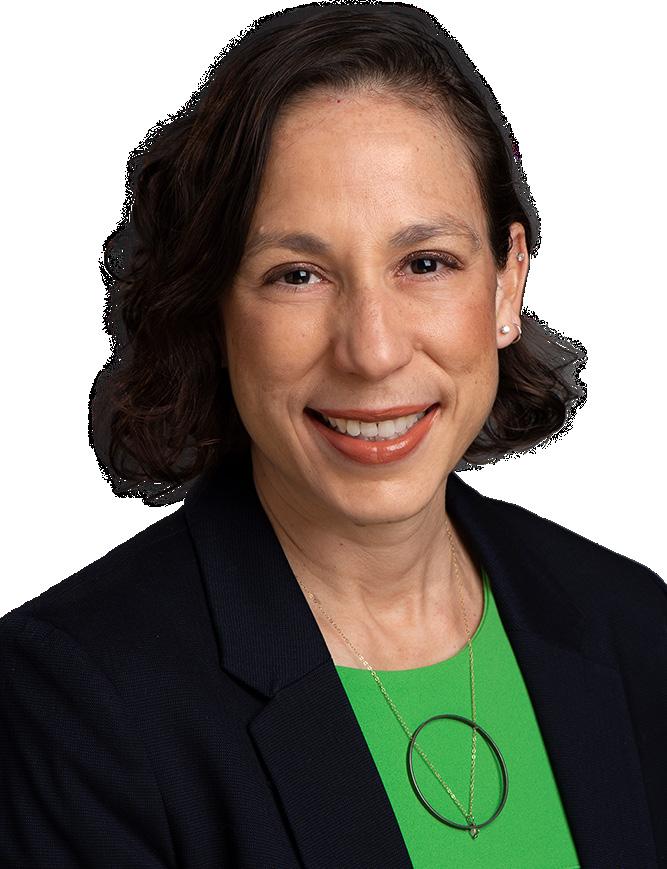
master’s, and doctorate from Pennsylvania State University, all in industrial and manufacturing engineering.
Throughout her career, Rivero has successfully spearheaded numerous research projects funded by federal agencies such as the National Science Foundation, Department of Energy, and NASA. Her accomplishments are further highlighted by numerous awards for research, service, and teaching, with notable mentions including the Society of Manufacturing Engineers John G. Bollinger Outstanding Young Manufacturing Engineer Award and the Woman of the Year in Education by the Hispanic Association of Women. Additionally, she is a distinguished fellow of the Institute of Industrial and Systems Engineers (IISE), serving as the first Hispanic woman to be selected fellow in IISE.
Rivero replaces David Kaber, Ph.D., who served as chair of ISE since 2018. Kaber left after helping transform ISE into one of the top departments in the country during his tenure.
“The ISE department has undergone a major transformational change over the past five years and has an advancing trend in rankings due to excellent faculty research and student academics,” Kaber said. “Dr. Rivero is an experienced and recognized scholar and academician in industrial and systems engineering, and I am confident
that she will take ISE to the next level through excellence in ISE science and practice.”
Rivero’s research group, the Interdisciplinary Manufacturing Engineering and Design (iMED) Lab, has made significant strides in designing scalable manufacturing techniques incorporating additive manufacturing for diverse material systems, ranging from biopolymers to metal alloys and concrete. At UF, she plans to expand her research to industrialized construction engineering in collaboration with her colleagues in ISE, the Engineering School of Sustainable Infrastructure & Environment, and the College of Design, Construction and Planning as part of a $2.5 million project using strategic funding from the office of former UF President Ben Sasse. For this purpose, the iMED lab will be moving into Weil Hall Structures and Materials Laboratory with a large-scale 3D printer capable of printing warehouses and buildings, among other structures.
Rivero also has extensive industry experience in advanced manufacturing systems and materials, having worked at Detroit Diesel Corp. and Honeywell Engines & Systems, and partnered for research with companies such as Pratt & Whitney and John Deere. Her contributions extend to collaborations with NASA’s Marshall Space Flight Center, where she served as a faculty fellow. In her role as department chair, she will seek to further strengthen ties with industry.
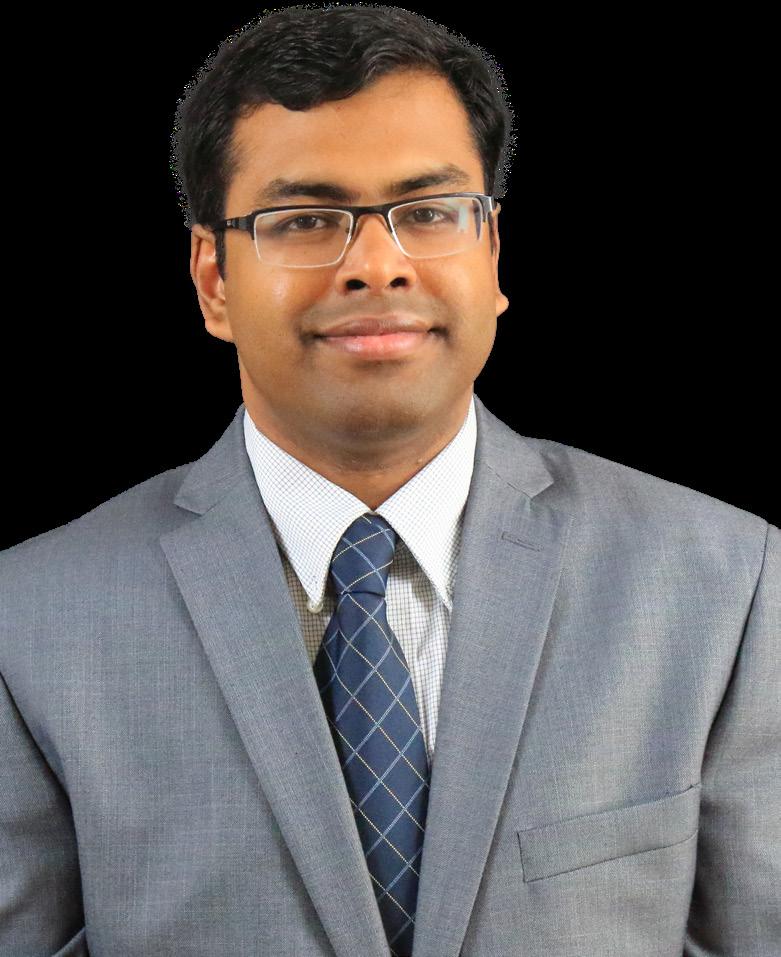
Associate Professor

Prior to the University of Florida, Chowdhury served as an assistant professor in the Department of Industrial, Manufacturing, and Systems Engineering at Texas Tech University. His research areas include computational biomechanics, traumatic brain injury, multiscale brain modeling, ergonomics, and helmets, exoskeleton and prosthetic designs. He received his Ph.D. in occupational biomechanics from West Virginia University in 2016. He was a postdoctoral fellow in the Department of Mechanical Engineering and Materials Science at the University of Pittsburgh from 2016 to 2017 and an Assistant Research Scientist at Texas A&M University from 2017 to 2019. He served as the Chair of the Occupational Ergonomics Technical Group of Human Factors and Ergonomics Society, USA, from 2020 to 2022. To date, he has secured about $2.2 million in grants and contracts as a lead principal investigator from various federal agencies, including the Department of Homeland Security, the CDC’s National Institute of Occupational Safety and Health, and the National Science Foundation’s prestigious CAREER award (2023).
Instructional Assistant Professor
Siddig joins the department as an instructional assistant professor. He received his Ph.D. in Industrial Engineering from Clemson University in 2021, and also holds a Master of Science in Industrial Engineering from Clemson (2019). He also earned a Master of Science in Actuarial Science from the University of Manchester (2015) and a Bachelor of Science with honors in Economics from the University of Khartoum (2013). Siddig has a distinguished record of teaching several data analytics and optimization courses at the undergraduate and graduate levels, and is also the recipient of teaching grants awarded by RWTH Aachen University. Siddig joins ISE following a three-year postdoctoral fellowship at RWTH Aachen University in Germany.



HOW MOSTAFA REISI GAHROOEI, PH.D. , IS BUILDING A NOVEL FRAMEWORK TO ASSIST RAPID DAMAGE ASSESSMENT AFTER DISASTERS
By Brady Budke
-Mostafa Reisi Gahrooei, Ph.D.
When disasters occur, conducting a rapid damage assessment (RDA) is crucial for making time-sensitive decisions.
The RDA plays a vital role in providing local governments with essential information to respond adequately to life-threatening situations. This includes directing first responders, analyzing potential hazards to critical infrastructure, determining the need for additional resources, and assisting with local resource allocations. These assessments rely on reports from citizens and local authorities, windshield surveys, and fly-over operations.
structures. This model uses domain and expert knowledge of a region to preliminarily estimate how the region may be impacted by an extreme event before it happens.
“Such a model estimates what the damage would look like in a region based on our knowledge of building distributions, type of buildings and built environment, land use, etc.,” Reisi Gahrooei said. “However, this is only a baseline as the actual impact of an extreme event depends on many factors related to the event itself.”
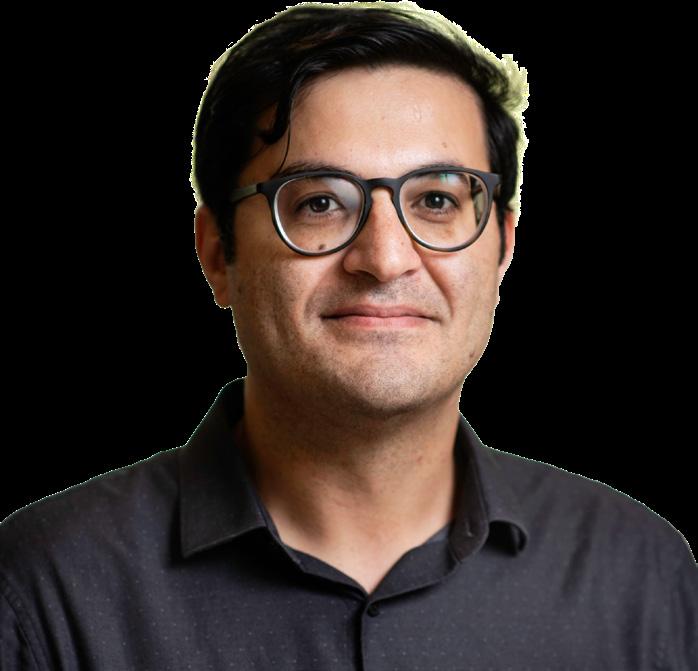

Using a grant from the National Science Foundation, Mostafa Reisi Gahrooei, Ph.D., an assistant professor, will design a systematic data collection method that estimates the level of damages based on current information and adaptively guides data collectors to locations where the damage-level estimates are highly uncertain. This method will allow data agents to collect reliable data under severe time and resource constraints.
“Extreme events often create unexpected situations that cannot be predicted beforehand,” Reisi Gahrooei said. “For example, while there are excellent predictions about how a hurricane may hit an area, the impact, level of damage and location of damage for that hurricane is very difficult to predict.”
The proposed method first constructs a pre-disaster preliminary probabilistic model of physical damage levels for different
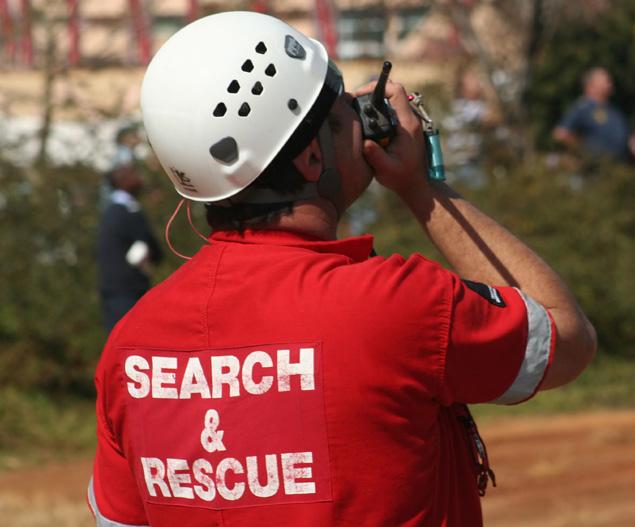
The model will determine initial trajectories for multiple data collectors to maximize information gain in the shortest possible time.
“For example, we may have a few drones flying over to collect data regarding the level of damage and a few humans who are driving around to collect data.” Reisi Gahrooei said.
This data-collection system will use a novel hierarchical Bayesian framework, which allows for continual updating of beliefs about the level of damage caused by an extreme event, based on new observations.
“As we collect data from a zone, or multiple zones, we continuously update our belief about the damage levels in the entire impacted region through the Bayesian framework,” Reisi Gahrooei said. “This continuous updating will allow us to identify what zones should be visited next.”
The outcomes of this project will set the stage for the development of automated damage-assessment systems that will result in more efficient and successful emergency management operations.
By Dave Schlenker
One of the country’s largest and most-advanced 3D construction printers, as in a printer that makes homes, has crossed the Atlantic Ocean and arrived at the University of Florida.
Manufactured by COBOD International in Denmark, the two-story printer was shipped in pieces to the Port of Savannah in Georgia and pulled into UF’s East Campus in September in two semi-trucks. It lives in “The Pit” (Weil Hall Structures and Materials Lab), a large industrial space in the Herbert Wertheim College of Engineering on the main campus.
This is COBOD’s newest 3D construction printer, the first of its new third-generation models sold in the United States. The primary three elements, mixer/cement silo, concrete piston pump and the 3D printer components, weigh 27,000 pounds, collectively.
“The opportunities for the interplay of artificial intelligence, machine learning, data analytics and smart manufacturing will be one of a kind in the country,” said Iris V. Rivero, Ph.D., department chair and Paul and Heidi Brown Preeminent Chair in Industrial and Systems Engineering who launched the effort to secure the 3D printer. “With UF’s access to the Space Coast, vast areas of
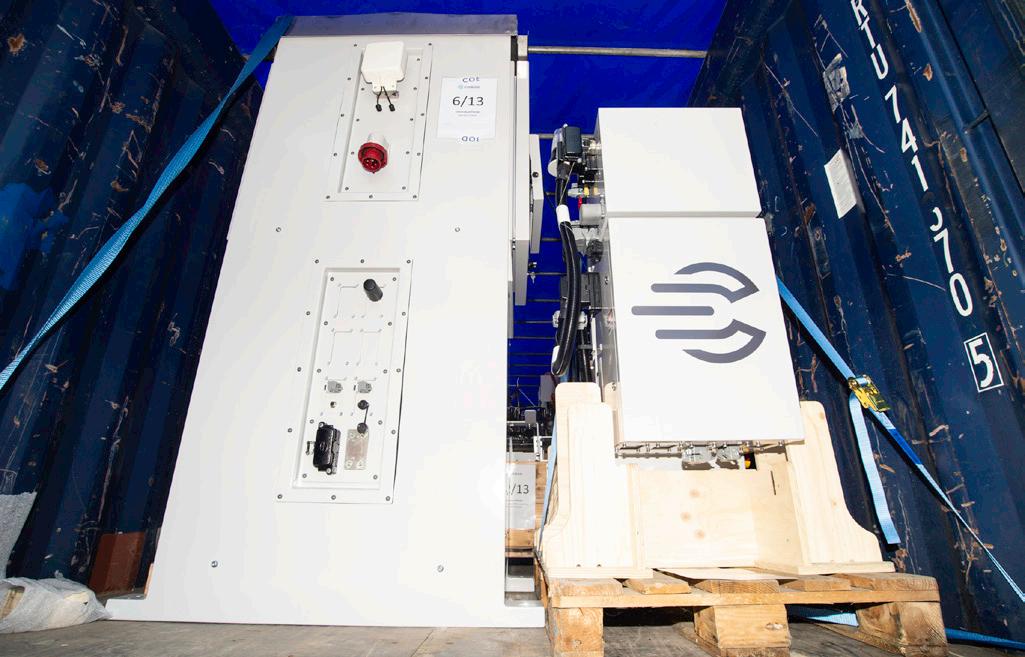
shoreline, and infrastructure needs, we will be the hub of innovation in Industrial Manufacturing Construction Engineering.
“UFs Department of Industrial & Systems Engineering will lead the path defining one-of-a-kind, infrastructure-driven interdisciplinary research and education,” she added.
The printer will be incorporated into curriculum for multiple departments in the college of Engineering, including lessons and projects in construction, manufacturing, materials, data analytics and operations research, structural health monitoring, coastal resilience, safety, design and sustainability.
Forrest J. Masters, Ph.D., interim dean of the college, said he looks forward to seeing the printer’s impact on curriculum, research and tangible industry outcomes.
“The addition of this cutting-edge equipment will distinguish UF from its peers by offering unique experiential learning opportunities,” Masters said. “UF remains at the forefront of addressing industry needs, and through the introduction of our new Industrialized Construction program, the 3D printer will exemplify the latest advancements in technology aimed at addressing critical societal challenges.”

Fall 2023 showcased significant growth in the number of students enrolled in both graduate and undergraduate programs offered through the department.
By Brady Budke
The Department of Industrial and Systems Engineering (ISE) has experienced significant growth in the number of students enrolled in graduate and undergraduate programs offered through the department. David Kaber, Ph.D., past department chair, said the growth has been elevated through new student recruiting efforts, new student funding programs, and an increase in departmental rankings.
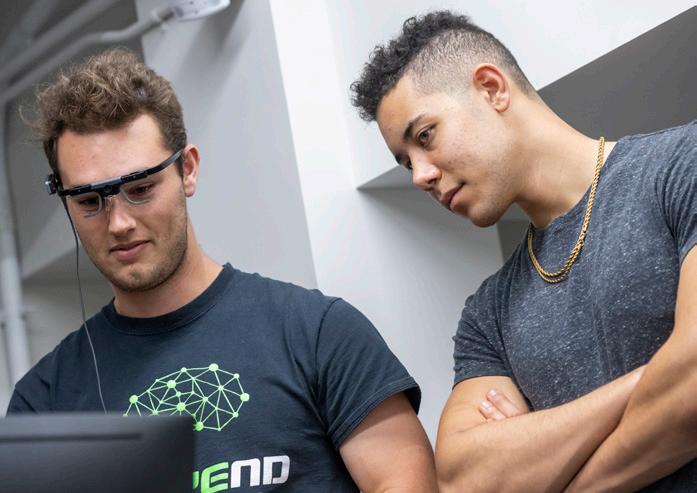
In fall 2023, ISE welcomed 15 new Ph.D. students, which is the largest entering class in the past five and a half years. One way the department has been able to bring on new students is through the newly implemented First Year Ph.D. Fellowship Program. Using the Harbert S. Gregory ISE Endowment fund, this fellowship program provides a stipend, tuition assistance, and health insurance for up to two Ph.D. students in their first year of study. Kaber said, “These are highly prestigious fellowships that allow students to enter our program without a defined work commitment and to align with a faculty member (over time) based on their specific research interests.”
In the master’s program, ISE welcomed 39 new students on campus and through the UF Electronic Delivery of Gator Engineering (EDGE) program. The department also saw 48 new students join the Outreach Engineering Management (OEM) master’s program.
The current total ISE graduate population is approximately 200 ISE students. The department has utilized the new Haldeman M.S. Admission Scholarship to further support new student access to ISE programs beyond the existing Academic Achievement Scholarships through the College of Engineering. Using support from the Harold D. Haldeman Jr. Endowment fund, the program provides up to 20 scholarships per year of $2,500 for a master’s student to conduct ISE research with a faculty member.
The departmental growth has also included the undergraduate program. During the past three years, the four-year graduation rate for the bachelor of science ISE program increased from approximately 12% to 37.1%, while the time spent earning a degree decreased from 4.92 years to 4.39 years. Despite the program moving more students to job placement sooner, program enrollment has increased since suppression of the pandemic.
“With the continuing increase in the state population and more students seeking engineering degrees covering methods and tools that flexibly apply to a broad range of applications,” Kaber said, “ISE programs are becoming high-growth majors of choice for students entering and studying at UF.”
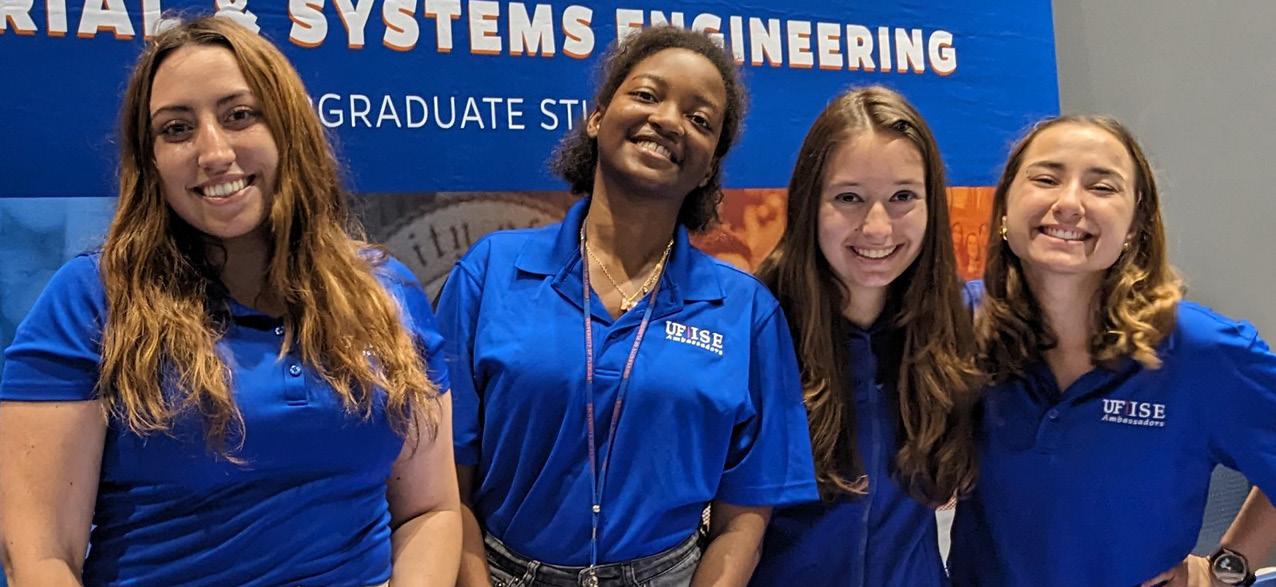

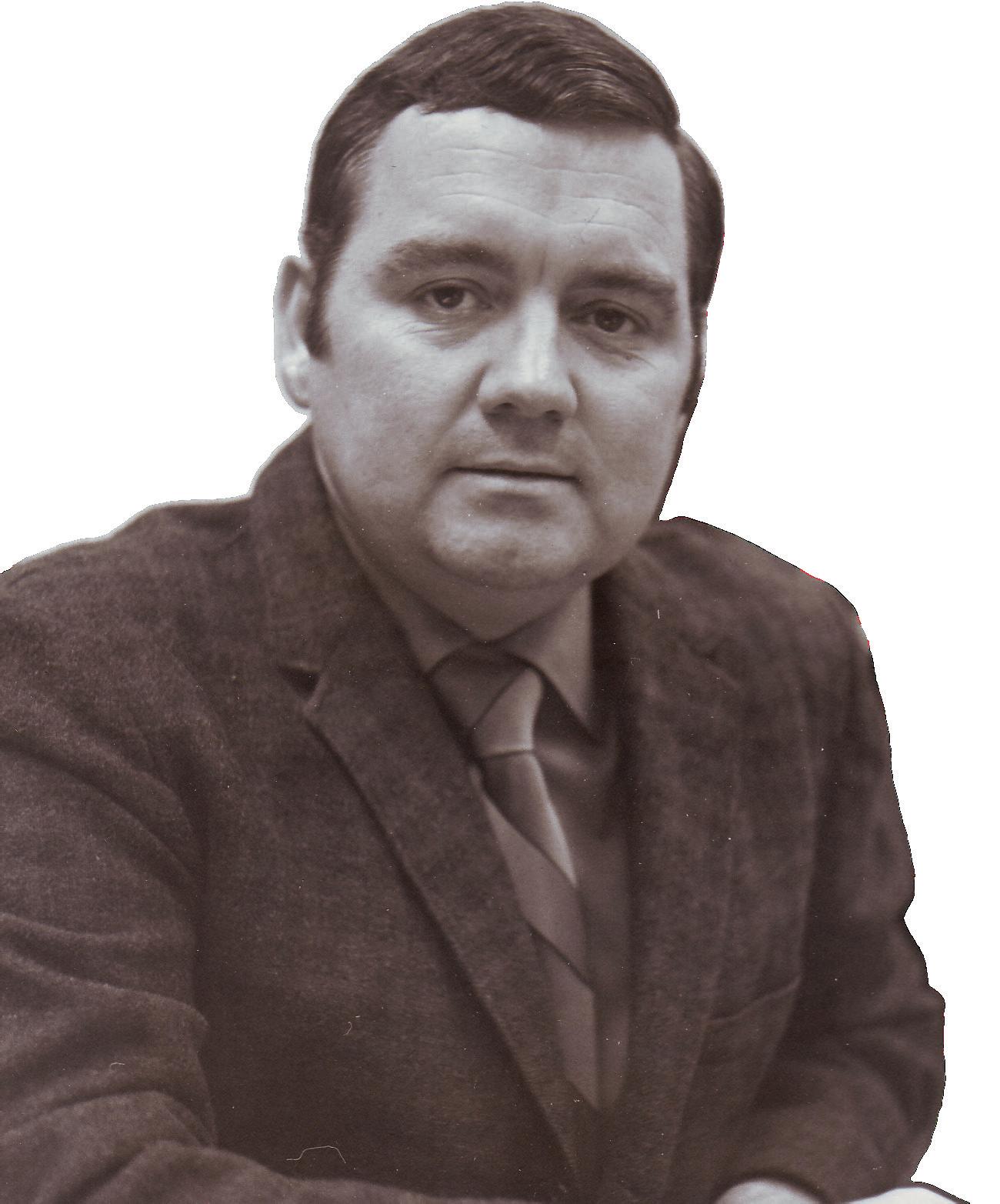
By David Kaber, Ph.D.
Robert Braswell, Ph.D., grew up in Boaz, Ala. After completing secondary school, he joined the Air Force and served in Korea during the war. He subsequently attended Snead College where he became inspired to a life in academia. In 1965, at 31 years old, Braswell became chair of what was then known as UF’s Industrial Engineering Department. He was a major figure in the department and a significant contributor to its development until he departed UF in 1974.
Braswell served as department chair for seven years through 1972. Under his leadership, the department made tremendous strides in terms of undergraduate program development, breadth of coverage of the industrial and systems engineering discipline, new graduate programs, and student graduations.
With Braswell’s start at UF, the department was renamed to the Department of Industrial & Systems Engineering (ISE). This change had implications for the existing degree programs with the undergraduate degree becoming a Bachelor of Science in ISE. At the same time, a new “systems engineering” option was created on the undergraduate level and a Bachelor of Science in Systems Engineering was added to the department curriculum. From the department’s historical record, this program was designed for coverage of “the more mathematically based techniques of OR (operations research) …” At that time, both the bachelor’s degrees required 140 credits as compared to the 125 hours for the current bachelor’s degree in ISE. During Braswell’s administration, the undergraduate curriculum was limited to engineering, mathematical statistics, and economics courses. Students took electives outside the department for breadth of study.
Under the direction of Braswell in 1967, the department added the Doctor of Philosophy program. The new program, according to historical record, was motivated by the need for “UF to maintain leadership in growth of the state and region,” and research facilities at the doctorate level were necessary. The doctorate was first offered with a major in systems engineering, which was then considered an OR-oriented degree. At the time, the department catalog included 40 courses at the 6000 level for graduate study. In 1969, the first three doctorate students graduated from the UF ISE program.
In 1970, based on faculty interests, Braswell approved and supported the introduction of the first health systems engineering courses in the department, making UF one of the first ISE programs in the country to offer courses in this application area. In 1971, the system engineering designation of the doctorate program was dropped, and students could prepare for a doctorate with specialization in industrial engineering, operations research, or systems engineering.
In 1974, Braswell took leave from the department to go to work at the Department of Defense. During his time in Washington, D.C., Braswell was appointed to the National Academy of Science. He went on to a faculty position at Florida State University (FSU) in 1986, serving as the Director of the Super Computing Laboratory.
Braswell retired from FSU in 2005, and passed away in 2022 in Tallahassee. He was a forward thinker in the ISE discipline and made seminal contributions to make the ISE department what it is today. He was a NASA Fellow and Hughes Fellow.
This article uses content from Braswell’s obituary, which was published in The Gainesville Sun.
The OEM program continues to draw strong demand from industry partners and students throughout Florida and beyond as it prepares to launch its 28th offering.
By Patsy Messinger, OEM Associate Director
Spring was a successful semester for our 2024 cohort, who graduated on May 5th. These students completed a semesterlong capstone project and showcased it to classmates and faculty advisors in April. To celebrate their hard work and the completion of their master’s degrees, we hosted a banquet at the Reitz Union where three of our students (Nick Becklund, Pat Osborne and Chris Waybright) shared remarks with attendees. Fourteen of the graduating students are continuing on to complete their Master of Business Administration (MBA) degrees at UF, and are expected to graduate in April 2025.
In the 2025 cohort, two students, Michaela Gosha and Michelle Nguyen, earned UF ISE departmental scholarships of $1,000.
This semester we held several recruiting events, including onsite visits to corporate partners Lockheed Martin, L3Harris Technologies, The Boeing Co. and Northrop Grumman, as well as open houses, presentations, tabling events, and webinars. An end-
of-semester networking reception was hosted for the 2024 and 2025 cohorts at Drive Shack in Orlando, which provided students with an opportunity to relax and socialize after final exams.
The Outreach Engineering Management program is a 20-month engineering master’s program for working professionals, with weekend-based classes that meet in Orlando. The program, which has abandoned GRE requirements, is designed so working professionals can balance work, family and their studies without having to choose an online program. Classes are presented live by UF engineering and business faculty one weekend each month, with two full days of instruction on Saturday and Sunday. A new cohort begins every August. Students develop skills in optimization, managing risk, logistics functions, improving manufacturing and service processes, and informed decision-making, as well as a solid foundation in business.
If you want to get involved or learn more about the program, please visit our website (ise.ufl.edu/oemp) or email messinger@ise.ufl.edu for more information!



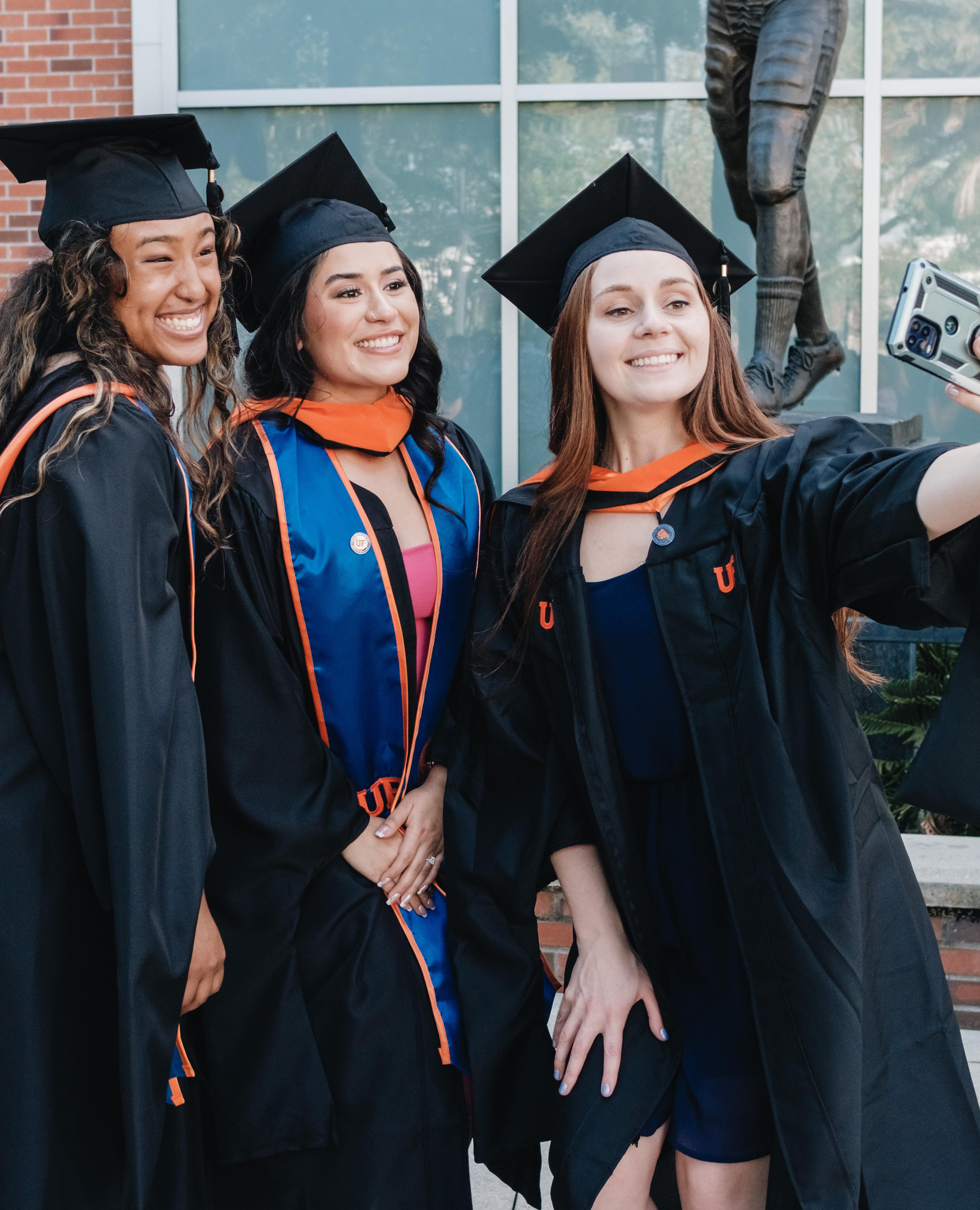
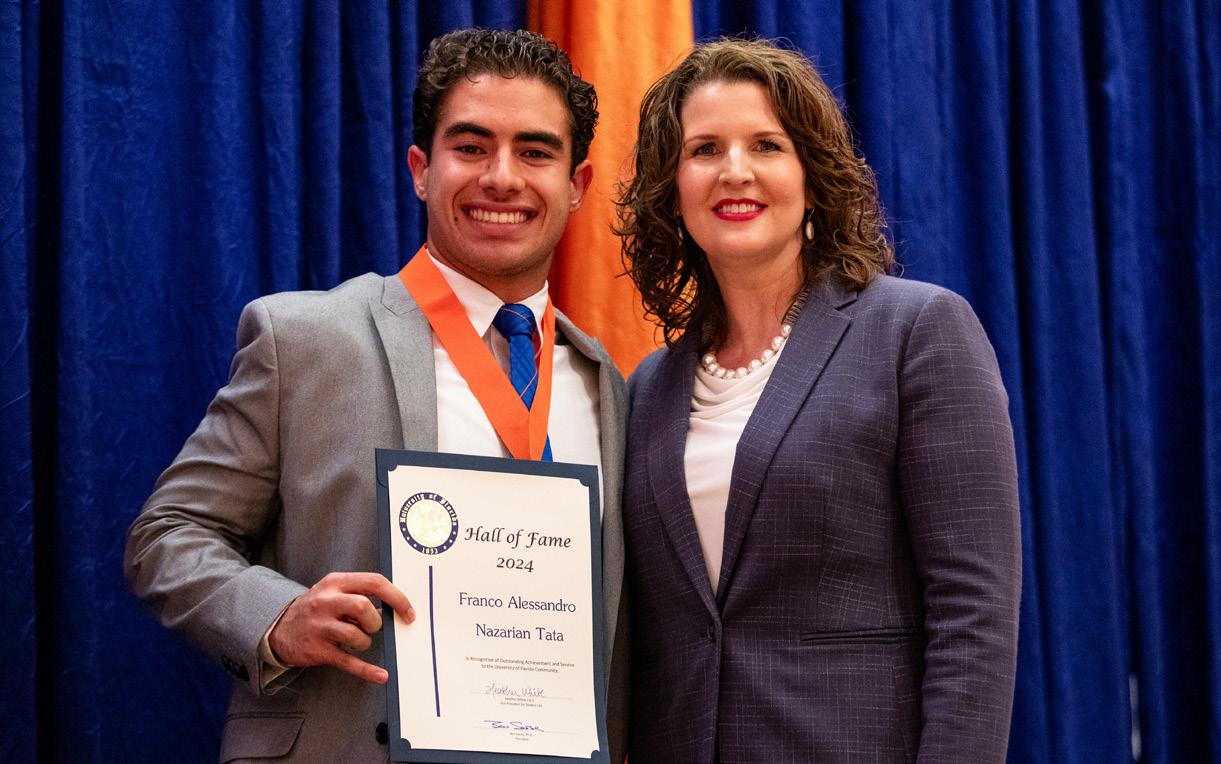
Franco Nazarian earns the highest honor given to seniors and graduate students at the University of Florida.
By Brady Budke
Franco Nazarian was selected to the UF Division of Student Life 2024 Hall of Fame. According to the division’s website, this honor is its highest recognition given to seniors and graduate students who have consistently demonstrated an outstanding commitment to improving UF through campus and community involvement, participation in organized campus activities, and scholastic achievement.
“I am humbled and grateful to be recognized as part of the Hall of Fame,” Nazarian said. “This great distinction reflects my accomplishments and the unwavering support and direction I have received from my community that believed in me throughout the [academic] journey.”
“I originally chose UF because of its affordability and stellar reputation as a top university, but it was the community that captivated me and solidified my decision,” Nazarian said. “As a first-generation and low-income student, the cost of attendance
was the main factor determining where I would attend. Fortunately, I received financial support from local scholarships, as well as the Southern Scholarship Foundation, allowing me to attend UF.”
Nazarian said he became interested in earning a degree in industrial and systems engineering after noticing its fascinating curriculum and extensive applications in a variety of industries, both of which matched his interests and career goals. Over the past three summers, he has been able to complete internships at Trane Technologies, Procter & Gamble, and General Mills.
“My career path and professional interests have been greatly influenced by the UF ISE department,” Nazarian said. “With the help of challenging coursework, practical projects, and industry professionals, I have improved my knowledge and abilities in areas like systems analysis, optimization, and decision-making.”
He said this award is an immense honor, and he is committed to upholding the values of leadership, service and excellence that define the induction.
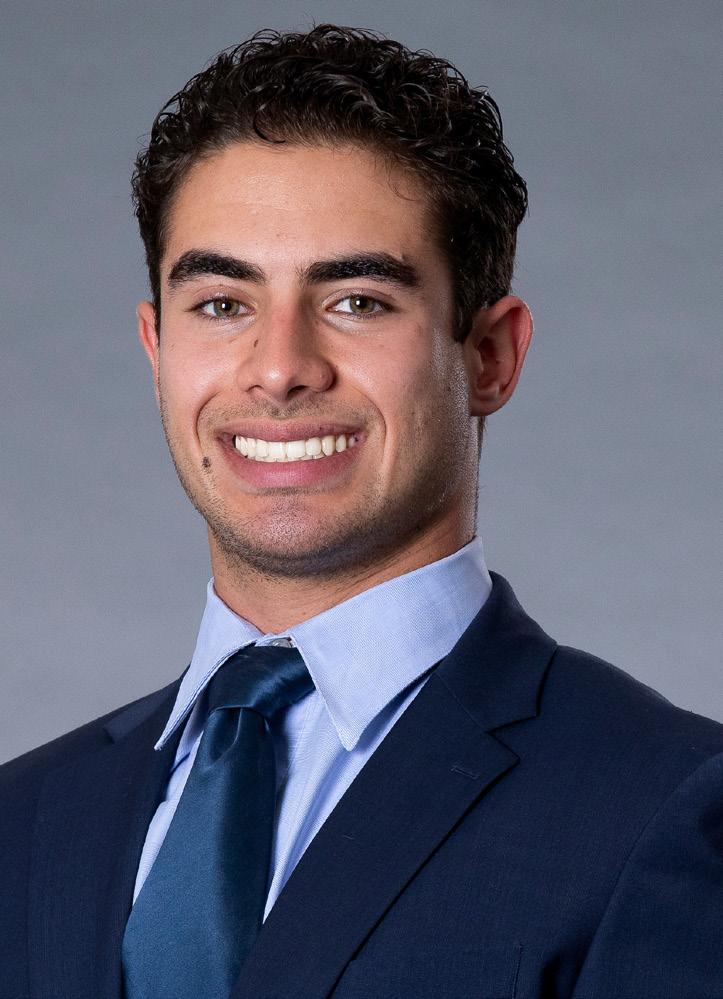

Scott Bartnick’s company, Otter PR, landed at No. 4 on the 2024 list of honorees.
By Brady Budke
Scott Bartnick (BSISE ‘15) has been named as a 2024 honoree of the Gator100 award. The award honors alumni from UF who have created and guided some of the fastest-growing businesses in the world. Bartnick is the co-founder & CEO of Otter PR, which ranks fourth on the 2024 list of honorees.
According to the Otter PR website, after attending UF, Bartnick spent several years working for Fortune 500 companies before launching his first entrepreneurial venture as an Amazon service consultant and brand marketer. He is an internationally renowned e-commerce and media expert who has been featured in Forbes, Entrepreneur, IBTimes, and more for his successes in founding ventures in e-commerce, marketing, media strategy and outreach. One of his earliest ventures, the Five-Day Startup, has also been transcribed into a bestselling book.
During the onset of the COVID-19 pandemic in early 2020, Bartnick co-founded Otter Public Relations as the company’s COO alongside Jay Feldman. Bartnick’s entrepreneurial passion and drive for generating mission-driven value have helped the company grow into a multi-million-dollar media agency working with some of the world’s top thought leaders, businesses, and entrepreneurs. His
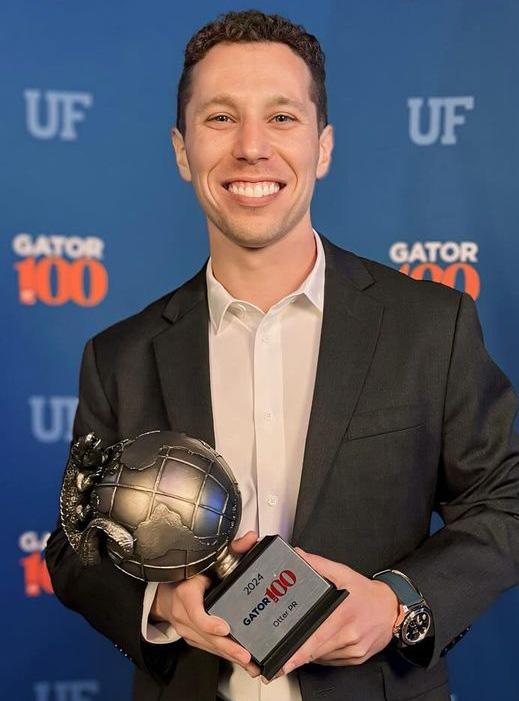
insight and expertise help them break into mainstream media and grow their brand into globally recognizable names.
About Otter PR: The company is the #1 PR firm on Clutch, G2, and UpCity while also boasting clients like Alibaba & US Congress. Based in Florida, the award-winning team of 45+ experts guarantee media coverage monthly. With 35+ awards and features in Forbes & The New York Times, the company redefines PR. Otter PR’s proprietary “OTR™” method emphasizes Outreach, Trends, and Relationships. Recognized by industry leaders and trusted by global brands, the company ensure your narrative stands out.


